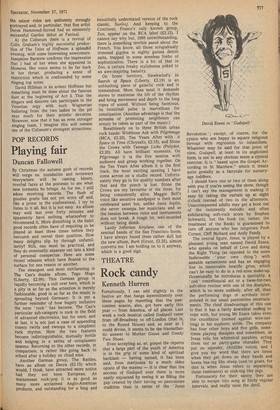POP RECORDS
Playing fair
Duncan Fallowell
By Christmas the autumn gush of records Will verge on inundation and reviewers everywhere will be casting bleary, overfed faces at the postman to see what new torments he brings. As for me, I still adore receiving records. The flush of goodies gratis has not yet worn off and, like a priest in the confessional, I try to listen to it all. But it is not easy. An album may well last over forty minutes and apparently have nothing whatsoever to recommend it. More disturbing is the habit good records often have of requiring to be played at least three times before they succumb and reveal their qualities. How many delights slip by through unfamiliarity? Still, one must be practical, and they do eventually separate out into a kind of personal conspectus. Here are some recent releases which have floated to the surface for one reason or another.
The strangest and most exhilarating is The Can's double album, Tago Mago '(Liberty, £2.99). This German group is rapidly becoming a cult over here, which is a pity in so far as the attention is merely fashionable, good in so far as the music is spreading beyond Germany. It is yet a further reminder of how hugely inclusive the term ' rock ' has become. The Can's particular sub-category is rock in the field of advanced electronics, but for once, and at last, it is not just a case of appending cosmic twirls and swoops to a simplistic rock rhythm. Here the two features become indistinguishable, mutually fertile and bulging in a series of ectoplasmic Spasms. Returning to the other records, in comparison, is rather like going back to school after a holiday on cloud nine.
Another German group, The Rattles, have an album on Decca (£2.15) which Would, I think, have attracted more notice had they not been European. As mainstream rock/pop it is as good as many more acclaimed Anglo-American products, and outstanding for a long and beautifully understated version of the rock classic, Susil-y. And keeping to the Continent, France's only known group, Zoo, appear on the RCA label (£2.15). I cannot say why but, 1968 notwithstanding, there is something terrible passé about the French. You know, all those scrupulously trimmed gigolos in eighty guinea denim suits, trapped in some zoneless limbo of sophistication. There is a bit of that in Zoo, a certain freaky stylishness yoked to an awe-inspiring banality.
On home territory, Hawkwind's In Search of Space (Liberty, £2.19) is an unblushing piece of galactic rock and is tremendous. More than most it demands stereo to maximise the lift of the rhythm and bring movement and depth to the long ropes of sound. Without being facetious, its intestinal pulse is marvellous for constipation. (Another advantage is that the screams of protesting neighbours can simply be taken as part of the music.) Breathlessly on to three British urban rock bands: Wishbone Ash with Pilgrimage (MCA, £2.20), Ten Years After with A Space in Time (Chrysalis, £2.15), and Stone the Crows with Teenage Licks (Polydor, £2.20). All have brilliant moments. On Pilgrimage it is the live session with audience and group working together. On the Ten Years After album it is the first track, the most exciting opening I have come across on a studio record. Unfortunately they go in for quality numbers after that and the punch is lost. Stone the Crows are my favourite of the three, for being consistently alive. Maggie Bell's voice like sensitive sandpaper is their most celebrated asset but, unlike Janis Joplin, she never swamps her musicians and so the tension between voice and instruments does not break. A tough lot, well-muscled without being dumb.
Lastly Jefferson Airplane, one of the seminal bands of the San Francisco boom. I have always found them rather dull but the new album, Bark (Grunt, £2.25), almost converts me. I am holding on to it anyway, which is a good sign.














































 Previous page
Previous page